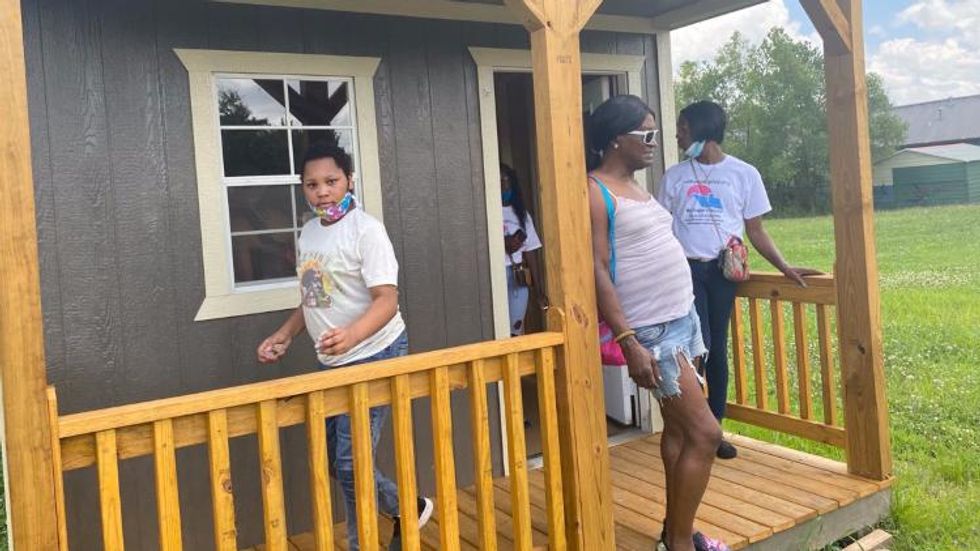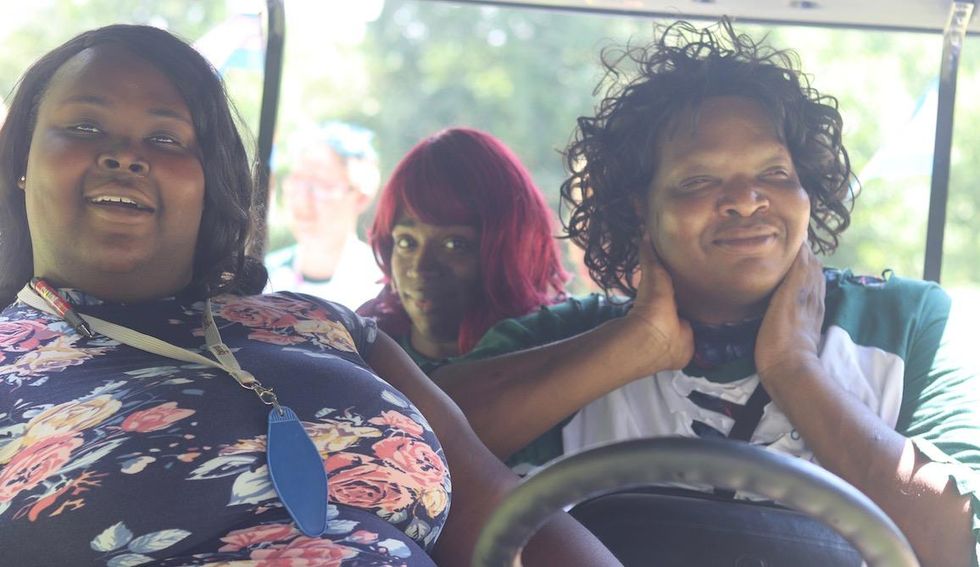In America today, one in five transgender people say they've been discriminated against when seeking a home, and nearly one in 10 have been evicted from their homes because of their gender identity, according to the National Center for Transgender Equality. However, one organization in Memphis believes tiny homes can help.
My Sistah's House is working to create long-term solutions for the housing crisis for Black trans women in the South. In addition to providing equitable housing, health care advocacy, career resources, and community spaces, My Sistah's House is going the extra mile to offer real solutions by building a small neighborhood of 20 tiny homes -- mortgage-free!
Thanks to a recent campaign that raised over $270,000 to date, with an end goal of $450,000, My Sistah's House is working hard to make the goal a reality by June 2021.
The long-term dream, however, goes beyond just building a neighborhood. The goal is to build a "retreat space" that is a self-reliant trans-led community with a farmers' market, community garden, and a wide network of job opportunities.
"The completion of a retreat space on the land will generate jobs, which is economic justice for the folks who will be living in the homes," says Kayla Gore, cofounder and executive director. "Just because we make folks homeowners doesn't mean that that changes their whole life. A lot of folks in the South don't have access to economic justice. Even though we have federal rulings that say we can't be fired because our gender identity, for a lot of trans folks in the South, we're not even in the workplace."
Courtesy My Sistah's House
Gore and her team want to create a plot of land where people can lease out business space while also giving opportunities for tenants living in these homes to work and cultivate the land to create a self-sustaining model.
The idea behind the retreat space began in the midst of a crisis.
When the pandemic began, Gore says several members of the organization who relied on their services tested positive and were unable to isolate themselves. A lot of them were living with friends or family members, so the idea of self-isolation was difficult. Members who had never experienced homelessness before were nearing the possibility of being put in a dire situation, and to make matters worse, My Sistah's House's emergency housing was at full capacity.
"Our team got together and was brainstorming, 'How do we create housing in this pandemic, in this moment?'" Gore says. "We just couldn't figure it out. We researched things and talked to other advocates across the United States, and a lot of the work that people were doing, like Janetta Johnson in California with the Trans Justice Project, was being co-opted. The work that [Johnson] put in to secure housing for the people in her community, trans folks, was not given to trans folks. And she put a lot of work in."
"We had to really think and strategize about how can we do something that we're creating and not relying on any type of entity," she continues. "The thing that kept coming up is land ownership, homeownership. That creates security for folks, being able to say, 'This is mine.'"
"There's a canal that runs down the back of the property line, so having a retreat space next to a river will be really appealing to folks," adds Gore, who is also the southern regional organizer for the Transgender Law Center. "We do retreats all over the South, and what a lot of organizations are doing, regional and national organizations, they're looking for places that are unique, like what we plan to have on our land: locally owned, Black-owned, brown-owned, BIPOC folks who are offering out spaces for convening."
Gore and her team, which was solely volunteer-led at first, started the campaign in April, and it took off immediately, thanks to a fervent push from the media.
The organization is now under contract to purchase 28 acres in Memphis to build the dream. Furthermore, the Indianapolis-based architecture firm DKGR recently provided the team with information on a live auction that will be selling tiny homes. Gore says her group is in the process of getting everything approved so they're able to actually bid on these homes.
The vision is for all homes to be completed by this time next year. People who have been through My Sistah's House's housing program -- many of whom have experienced homelessness anywhere from a couple days to over a year -- are on the shortlist. But it's still not enough.
"A lot of our folks who have come through our program are not securely housed," she explains. "We have about 400 people in our Rolodex who've accessed some of our services before. There's not a scarcity of people. There's going to be a scarcity of housing."
The organization is also considering working with another local group, Community Alliance for the Homeless, which has been collecting data on people experiencing homelessness in the area, to determine how severe some situations are so it can better facilitate assigning homes.
While the project is certainly not going to solve the housing crisis for trans people in the South, it's a hell of a start.
"I used to work at the LGBT community center here, and we saw a lot of trans adults who were trying to seek emergency shelter but weren't able to because of their body and how they showed up with gender expression," Gore says. "They weren't able to access those shelters, and if they were able to access them, they were presented with options of having to conform and be put in harm's way. Trans women will be housed with men and trans men would be housed with women, and those who don't conform would just fall [through the system]."
Still, Gore says this kind of discrimination is not entirely the fault of these particular organizations. The crux of the problem is at the state level.
"There are state guidelines saying that in housing, you have to have designated spaces for male and female -- and we know there are more genders than that," she explains.
This was ultimately the genesis of My Sistah's House, which she and her cofounders started two years ago.
"Some people needed clothing and other immediate needs that we needed to be able to provide in order for them to be able to transition out of that space," she explains.
Eventually, Gore and her team received an opportunity to buy the house they're currently in through a nonprofit organization that helps lower-income folks become homeowners. Currently, they're able to house four people at a time in their headquarters. The dream of building a retreat space, however, will change all that.
"Earlier this year, before we launched the campaign, our budget was $37,000," she says. "That was our operating budget, and all of that was restricted to programming. We were doing a lot of work in the community in partnership with other organizations, which was seemingly working for us. But in a lot of those situations, there was a lot of [back-and-forth] we had to do in order to make the connection to get our our folks, our community, access to resources. It gets tiring, exhausting, and we experienced the burnout."
The back-and-forth is what ultimately pushed Gore and her team to crowdfund, simply because there's "not a lot of federal dollars out there when it relates to housing adults, but there's [lots of money] for LGBT youth, and we understand that," she says. "But there needs to be more access when it comes to resources for organizations like My Sistah's House in the South."
To learn more about how you can donate to My Sistah's House, visit GoFundMe.com.

















